
Poets' Corner
Encyclopedia
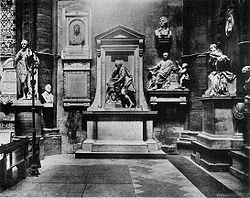
Westminster Abbey
The Collegiate Church of St Peter at Westminster, popularly known as Westminster Abbey, is a large, mainly Gothic church, in the City of Westminster, London, United Kingdom, located just to the west of the Palace of Westminster. It is the traditional place of coronation and burial site for English,...
because of the number of poets, playwrights, and writers buried and commemorated there. The most recent additions were a memorial floor stone unveiled in 2009 for the founders of the Royal Ballet and a panel to Elizabeth Gaskell
Elizabeth Gaskell
Elizabeth Cleghorn Gaskell, née Stevenson , often referred to simply as Mrs Gaskell, was a British novelist and short story writer during the Victorian era...
in the memorial window dedicated on 25 September 2010. The next planned addition is for Ted Hughes
Ted Hughes
Edward James Hughes OM , more commonly known as Ted Hughes, was an English poet and children's writer. Critics routinely rank him as one of the best poets of his generation. Hughes was British Poet Laureate from 1984 until his death.Hughes was married to American poet Sylvia Plath, from 1956 until...
to be honoured. The ceremony for Ted Hughes's memorial will take place on 6 December 2011.
History
The first person interred, Geoffrey ChaucerGeoffrey Chaucer
Geoffrey Chaucer , known as the Father of English literature, is widely considered the greatest English poet of the Middle Ages and was the first poet to have been buried in Poet's Corner of Westminster Abbey...
, owed his burial there in 1400 more to his position as Clerk of Works of the Palace of Westminster
Palace of Westminster
The Palace of Westminster, also known as the Houses of Parliament or Westminster Palace, is the meeting place of the two houses of the Parliament of the United Kingdom—the House of Lords and the House of Commons...
than to his fame as a writer. The erection of his magnificent tomb, however, by Nicholas Brigham in 1556 (to where Chaucer's remains were then transferred) and the nearby burial of Edmund Spenser
Edmund Spenser
Edmund Spenser was an English poet best known for The Faerie Queene, an epic poem and fantastical allegory celebrating the Tudor dynasty and Elizabeth I. He is recognised as one of the premier craftsmen of Modern English verse in its infancy, and one of the greatest poets in the English...
in 1599 started a tradition that is still upheld. The area also houses the tombs of several Canons
Canon (priest)
A canon is a priest or minister who is a member of certain bodies of the Christian clergy subject to an ecclesiastical rule ....
and Deans
Deans
-People:* Craig Deans, soccer player* Diane Deans, politician* Ian Deans, politician* John "Dixie" Deans, soccer player* Kathryn Deans, author* Mickey Deans, fifth and last husband of Judy Garland* Robbie Deans, rugby coach and former player...
of the Abbey, as well as the grave of Thomas Parr who, it is said, died at the age of 152 in 1635 after having seen ten sovereigns on the throne.
Burial or commemoration in the Abbey does not always occur at or soon after the time of death. Lord Byron
George Gordon Byron, 6th Baron Byron
George Gordon Byron, 6th Baron Byron, later George Gordon Noel, 6th Baron Byron, FRS , commonly known simply as Lord Byron, was a British poet and a leading figure in the Romantic movement...
, for example, whose poetry was admired but who maintained a scandalous lifestyle, died in 1824 but was not given a memorial until 1969. Even William Shakespeare
William Shakespeare
William Shakespeare was an English poet and playwright, widely regarded as the greatest writer in the English language and the world's pre-eminent dramatist. He is often called England's national poet and the "Bard of Avon"...
, buried at Stratford-upon-Avon
Stratford-upon-Avon
Stratford-upon-Avon is a market town and civil parish in south Warwickshire, England. It lies on the River Avon, south east of Birmingham and south west of Warwick. It is the largest and most populous town of the District of Stratford-on-Avon, which uses the term "on" to indicate that it covers...
in 1616, was not honoured with a monument until 1740 when one designed by William Kent
William Kent
William Kent , born in Bridlington, Yorkshire, was an eminent English architect, landscape architect and furniture designer of the early 18th century.He was baptised as William Cant.-Education:...
was constructed in Poets' Corner. Samuel Horsley
Samuel Horsley
Samuel Horsley was a British churchman, bishop of Rochester from 1792.Entering Trinity Hall, Cambridge in 1751, he became LL.B. in 1758 without graduating in arts. In the following year he succeeded his father in the living of Newington Butts in Surrey...
, Dean of Westminster in 1796, was said to have tartly refused the request for actress Kitty Clive
Kitty Clive
Catherine "Kitty" Clive was a British actress of considerable repute on the stages of London.Most likely born in London, her father William Raftor was an Irishman and former officer in the French army under Louis XIV...
to be buried in the Abbey:
- if we do not draw some line in this theatrical ambition to mortuary fame, we shall soon make Westminster Abbey little better than a Gothic Green RoomGreen roomIn British English and American English show business lexicon, the green room is that space in a theatre, a studio, or a similar venue, which accommodates performers or speakers not yet required on stage...
!
Not all poets appreciated memorialisation and Samuel Wesley
Samuel Wesley (poet)
Samuel Wesley was a poet and a writer of controversial prose. He was also the father of John Wesley and Charles Wesley, founders of the Methodist Church.-Family and early life:...
's epitaph for Samuel Butler
Samuel Butler (poet)
Samuel Butler was a poet and satirist. Born in Strensham, Worcestershire and baptised 14 February 1613, he is remembered now chiefly for a long satirical burlesque poem on Puritanism entitled Hudibras.-Biography:...
, who supposedly died in poverty, continued Butler's satiric tone:
- While Butler, needy wretch, was yet alive,
- No generous patron would a dinner give;
- See him, when starv'd to death, and turn'd to dust,
- Presented with a monumental bust.
- The poet's fate is here in emblem shown,
- He ask'd for bread, and he received a stone.
Some of those buried in Poets' Corner also had memorials erected to them over or near their grave, either around the time of their death or later. In some cases, such as Joseph Addison
Joseph Addison
Joseph Addison was an English essayist, poet, playwright and politician. He was a man of letters, eldest son of Lancelot Addison...
, the burial took place elsewhere in Westminster Abbey, with a memorial later erected in Poets' Corner. In some cases a full burial of a body took place, in other cases the body was cremated and the ashes buried. There are also cases where there was support for a particular individual to be buried in Poets' Corner, but the decision was made to bury them elsewhere in the Abbey, such as Edward Bulwer Lytton. Other notable poets and writers, such as Aphra Behn
Aphra Behn
Aphra Behn was a prolific dramatist of the English Restoration and was one of the first English professional female writers. Her writing contributed to the amatory fiction genre of British literature.-Early life:...
, are buried elsewhere in the Abbey. At least two of the memorials (both to individuals buried in Poets' Corner – Rowe and Gay
John Gay
John Gay was an English poet and dramatist and member of the Scriblerus Club. He is best remembered for The Beggar's Opera , set to music by Johann Christoph Pepusch...
) were later moved to a location elsewhere in the Abbey due to the discovery of old paintings on the wall behind them.
Memorial types
The memorials can take several forms. Some are stone slabs set in the floor with a name and inscription carved on them, while others are more elaborate and carved stone monuments, or hanging stone tablets, or memorial busts. Some are commemorated in groups, such as the joint memorial for the Brontë sisters (commissioned in 1939, but not unveiled until 1947 due to the war), the sixteen World War I poets inscribed on a stone floor slab and unveiled in 1985, and the four founders of the Royal Ballet, commemorated together in 2009.The grave of Ben Jonson
Ben Jonson
Benjamin Jonson was an English Renaissance dramatist, poet and actor. A contemporary of William Shakespeare, he is best known for his satirical plays, particularly Volpone, The Alchemist, and Bartholomew Fair, which are considered his best, and his lyric poems...
has the inscription "O Rare Ben Johnson" (sic) on the slab above it. It has been suggested that this could be read "Orare Ben Jonson" (pray for Ben Jonson), which would indicate a deathbed return to Catholicism, but the carving shows a distinct space between "O" and "rare". The fact that he was buried in an upright grave could be an indication of his reduced circumstances at the time of his death but it has also been suggested that Jonson asked for a grave exactly 18 inches square from the monarch and received an upright grave to fit in the requested space.
As floor and wall space began to run out, the decision was taken to install a stained glass memorial window (unveiled in 1994 in memory of Edward Horton Hubbard), and it is here that new names are added in the form of inscribed panes of glass. There is room for 20 names, and currently (early 2010) there are six names on this window, with a new entry (Elizabeth Gaskell
Elizabeth Gaskell
Elizabeth Cleghorn Gaskell, née Stevenson , often referred to simply as Mrs Gaskell, was a British novelist and short story writer during the Victorian era...
) planned for 25 September 2010.
Burials
| Image | Name | Born | Died | Age at death | Details of funeral |
Occupation |
|---|---|---|---|---|---|---|
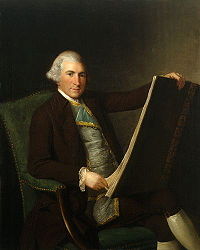 |
Robert Adam Robert Adam Robert Adam was a Scottish neoclassical architect, interior designer and furniture designer. He was the son of William Adam , Scotland's foremost architect of the time, and trained under him... |
1728 | 1792 | 63 | ... | Architect |
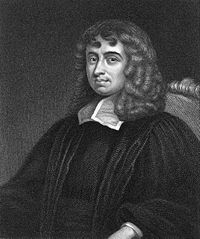 |
Isaac Barrow Isaac Barrow Isaac Barrow was an English Christian theologian, and mathematician who is generally given credit for his early role in the development of infinitesimal calculus; in particular, for the discovery of the fundamental theorem of calculus. His work centered on the properties of the tangent; Barrow was... |
1630 | 1677 | 46 | ... | Mathematician |
| Francis Beaumont Francis Beaumont Francis Beaumont was a dramatist in the English Renaissance theatre, most famous for his collaborations with John Fletcher.... |
1584 | 1616 | 31–32 | Grave is unmarked. Name is inscribed on the Cowley gravestone. | Playwright | |
| ... | John Beaumont | 1583 | 1627 | 43–44 | ... | Poet |
| ... | William Benson William Benson (abbot) William Benson was an English Benedictine, the last Abbot of Westminster and first Dean of Westminster. He was a friend of Thomas Cranmer, and belonged to the evangelical circle around Cranmer that included Thomas Goodrich, Hugh Latimer and Thomas Thirlby.-Life:A native of Boston, Lincolnshire,... |
unknown | 1549 | unknown | ... | Abbot of Westminster |
| ... | Mary Eleanor Bowes | 1749 | 1800 | 51 | Reported by some to have been buried in a court dress, with all the accessories necessary for a Royal audience, plus a small silver trumpet, and by others as in her bridal dress. | Poet and playwright |
| Robert Browning Robert Browning Robert Browning was an English poet and playwright whose mastery of dramatic verse, especially dramatic monologues, made him one of the foremost Victorian poets.-Early years:... |
1812 | 1889 | 77 | Browning's grave immediately adjacent to that of Alfred Tennyson. | Poet and playwright | |
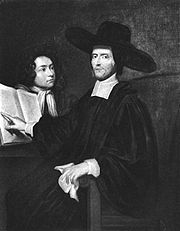 |
Richard Busby Richard Busby The Rev. Dr. Richard Busby was an English Anglican priest who served as head master of Westminster School for more than fifty-five years.-Life:... |
1606 | 1695 | 88–89 | ... | Headmaster |
| William Camden William Camden William Camden was an English antiquarian, historian, topographer, and officer of arms. He wrote the first chorographical survey of the islands of Great Britain and Ireland and the first detailed historical account of the reign of Elizabeth I of England.- Early years :Camden was born in London... |
1551 | 1623 | 72 | ... | Antiquarian and historian | |
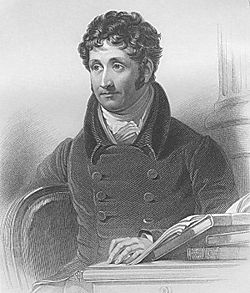 |
Thomas Campbell | 1777 | 1844 | 66 | Funeral 3 July 1844. | Poet |
| ... | Henry Francis Cary Henry Francis Cary Henry Francis Cary was a British author and translator, best known for his blank verse translation of The Divine Comedy of Dante.-Biography:Henry Francis Cary was born in Gibraltar, on 6 December 1772... |
1772 | 1844 | 72 | Funeral 14 August 1844. | Author and translator |
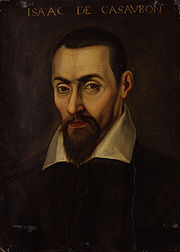 |
Isaac Casaubon Isaac Casaubon Isaac Casaubon was a classical scholar and philologist, first in France and then later in England, regarded by many of his time as the most learned in Europe.-Early life:... |
1559 | 1614 | 55 | ... | Classical scholar |
| William Chambers William Chambers (architect) Sir William Chambers was a Scottish architect, born in Gothenburg, Sweden, where his father was a merchant. Between 1740 and 1749 he was employed by the Swedish East India Company making several voyages to China where he studied Chinese architecture and decoration.Returning to Europe, he studied... |
1723 | 1796 | 75 | ... | Architect | |
.jpg) |
Geoffrey Chaucer Geoffrey Chaucer Geoffrey Chaucer , known as the Father of English literature, is widely considered the greatest English poet of the Middle Ages and was the first poet to have been buried in Poet's Corner of Westminster Abbey... |
c. 1343 | 1400 | 56–57 | Grave is unmarked. Name is inscribed on the Cowley gravestone. Memorial was also erected. | Author and poet |
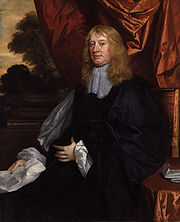 |
Abraham Cowley Abraham Cowley Abraham Cowley was an English poet born in the City of London late in 1618. He was one of the leading English poets of the 17th century, with 14 printings of his Works published between 1668 and 1721.-Early life and career:... |
1618 | 1667 | 48–49 | ... | Poet |
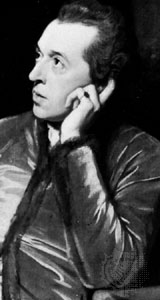 |
Richard Cumberland Richard Cumberland (dramatist) Richard Cumberland was a British dramatist and civil servant. In 1771 his hit play The West Indian was first staged. During the American War of Independence he acted as a secret negotiator with Spain in an effort to secure a peace agreement between the two nations. He also edited a short-lived... |
1732 | 1811 | 79 | ... | Playwright |
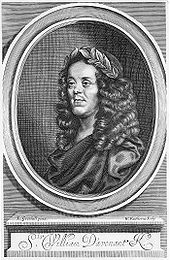 |
William Davenant William Davenant Sir William Davenant , also spelled D'Avenant, was an English poet and playwright. Along with Thomas Killigrew, Davenant was one of the rare figures in English Renaissance theatre whose career spanned both the Caroline and Restoration eras and who was active both before and after the English Civil... |
1606 | 1668 | 62 | ... | Poet and playwright |
| John Denham John Denham (poet) Sir John Denham was an English poet and courtier. He served as Surveyor of the King's Works and is buried in Westminster Abbey.... |
1614 or 1615 | 1669 | 63–65 | Grave is unmarked. Name is inscribed on the Cowley gravestone. | Poet | |
| Charles Dickens Charles Dickens Charles John Huffam Dickens was an English novelist, generally considered the greatest of the Victorian period. Dickens enjoyed a wider popularity and fame than had any previous author during his lifetime, and he remains popular, having been responsible for some of English literature's most iconic... |
1812 | 1870 | 58 | Dickens's will did not dictate his place of burial, but stipulated that there be no grand funeral ceremony. He was therefore given a secret early-morning funeral in the Abbey, 14 June 1870. | Author | |
 |
Michael Drayton Michael Drayton Michael Drayton was an English poet who came to prominence in the Elizabethan era.-Early life:He was born at Hartshill, near Nuneaton, Warwickshire, England. Almost nothing is known about his early life, beyond the fact that in 1580 he was in the service of Thomas Goodere of Collingham,... |
1563 | 1631 | 67–68 | Died in London. Monument placed by the Countess of Dorset Lady Anne Clifford Lady Anne Clifford, 14th Baroness de Clifford was the only surviving child of George Clifford, 3rd Earl of Cumberland by his wife Lady Margaret Russell, daughter of Francis Russell, 2nd Earl of Bedford... , with memorial lines attributed to Ben Jonson Ben Jonson Benjamin Jonson was an English Renaissance dramatist, poet and actor. A contemporary of William Shakespeare, he is best known for his satirical plays, particularly Volpone, The Alchemist, and Bartholomew Fair, which are considered his best, and his lyric poems... . |
Poet |
 |
John Dryden John Dryden John Dryden was an influential English poet, literary critic, translator, and playwright who dominated the literary life of Restoration England to such a point that the period came to be known in literary circles as the Age of Dryden.Walter Scott called him "Glorious John." He was made Poet... |
1631 | 1700 | 68 | Grave is unmarked. Name is inscribed on the Cowley gravestone. Memorial was also erected. | Poet and playwright |
| ... | Adam Fox Adam Fox Adam Fox , Canon, was the Dean of Divinity at Magdalen College, Oxford. He was one of the first members of the "Inklings", a literary group which also included C.S. Lewis and J.R.R. Tolkien. Between 1938 and 1942 he was Professor of Poetry. Later he became Canon of Westminster Abbey and he is... |
1883 | 1977 | 93–94 | ... | Oxford Professor of Poetry Canon of Westminster Abbey |
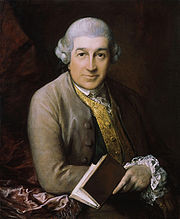 |
David Garrick David Garrick David Garrick was an English actor, playwright, theatre manager and producer who influenced nearly all aspects of theatrical practice throughout the 18th century and was a pupil and friend of Dr Samuel Johnson... |
1717 | 1779 | 61 | ... | Playwright |
 |
Eva Marie Veigel Eva Marie Veigel Eva Marie Veigel was a dancer and the wife of actor David Garrick.... |
1724 | 1822 | 98 | ... | Dancer |
 |
John Gay John Gay John Gay was an English poet and dramatist and member of the Scriblerus Club. He is best remembered for The Beggar's Opera , set to music by Johann Christoph Pepusch... |
1685 | 1732 | 47 | ... | Poet and playwright |
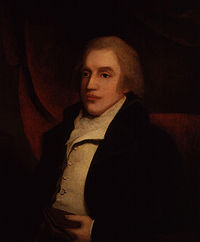 |
William Gifford William Gifford William Gifford was an English critic, editor and poet, famous as a satirist and controversialist.-Life:Gifford was born in Ashburton, Devonshire to Edward Gifford and Elizabeth Cain. His father, a glazier and house painter, had run away as a youth with vagabond Bampfylde Moore Carew, and he... |
1756 | 1826 | 70 | Gifford wanted to be buried in South Audley Chapel, "but for the pressing request of his grateful executor |
Poet and editor |
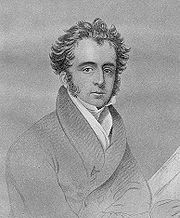 |
George Grote George Grote George Grote was an English classical historian, best known in the field for a major work, the voluminous History of Greece, still read.-Early life:He was born at Clay Hill near Beckenham in Kent... |
1794 | 1871 | 76 | ... | Historian |
| Richard Hakluyt Richard Hakluyt Richard Hakluyt was an English writer. He is principally remembered for his efforts in promoting and supporting the settlement of North America by the English through his works, notably Divers Voyages Touching the Discoverie of America and The Principal Navigations, Voiages, Traffiques and... |
c.1552 | 1616 | 63–64 | ... | Author | |
 |
George Frideric Handel George Frideric Handel George Frideric Handel was a German-British Baroque composer, famous for his operas, oratorios, anthems and organ concertos. Handel was born in 1685, in a family indifferent to music... |
1685 | 1759 | 74 | ... | Composer |
| Thomas Hardy Thomas Hardy Thomas Hardy, OM was an English novelist and poet. While his works typically belong to the Naturalism movement, several poems display elements of the previous Romantic and Enlightenment periods of literature, such as his fascination with the supernatural.While he regarded himself primarily as a... |
1840 | 1928 | 87 | Hardy's funeral, on 16 January 1928, proved a controversial occasion because Hardy himself had wished to be interred at Stinsford Stinsford Stinsford is a village in south west Dorset, England, one mile east of Dorchester. The village has a population of 346 , 13.5% of dwellings are second homes .... in the same grave as his first wife, Emma. His executor Sir Sydney Carlyle Cockerell, however, insisted that he be placed in the Poets' Corner. A compromise was reached whereby his heart was buried at Stinsford with Emma, and his ashes in the Abbey. |
Author and poet | |
 |
Henry Irving Henry Irving Sir Henry Irving , born John Henry Brodribb, was an English stage actor in the Victorian era, known as an actor-manager because he took complete responsibility for season after season at the Lyceum Theatre, establishing himself and his company as... |
1838 | 1905 | 67 | ... | Actor |
 |
Dr Samuel Johnson Samuel Johnson Samuel Johnson , often referred to as Dr. Johnson, was an English author who made lasting contributions to English literature as a poet, essayist, moralist, literary critic, biographer, editor and lexicographer... |
1709 | 1784 | 75 | ... | Author, poet and lexicographer |
| Rudyard Kipling Rudyard Kipling Joseph Rudyard Kipling was an English poet, short-story writer, and novelist chiefly remembered for his celebration of British imperialism, tales and poems of British soldiers in India, and his tales for children. Kipling received the 1907 Nobel Prize for Literature... |
1865 | 1936 | 70 | ... | Author and poet | |
| ... | Nicholas Litlington | before 1315 | 1386 | 70+ | ... | Abbot of Westminster |
| Thomas Macaulay Thomas Babington Macaulay, 1st Baron Macaulay Thomas Babington Macaulay, 1st Baron Macaulay PC was a British poet, historian and Whig politician. He wrote extensively as an essayist and reviewer, and on British history... |
1800 | 1859 | 59 | Public funeral, 9 January 1860. | Poet and historian | |
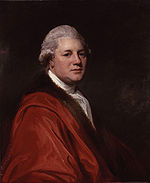 |
James Macpherson James Macpherson James Macpherson was a Scottish writer, poet, literary collector and politician, known as the "translator" of the Ossian cycle of poems.-Early life:... |
1736 | 1796 | 59 | ... | Author and poet |
| John Masefield John Masefield John Edward Masefield, OM, was an English poet and writer, and Poet Laureate of the United Kingdom from 1930 until his death in 1967... |
1878 | 1967 | 88 | According to his wishes, was cremated and his ashes placed in Poets’ Corner. | Poet and author | |
| ... | Robert Moray Robert Moray Sir Robert Moray was a Scottish soldier, statesman, diplomat, judge, spy, freemason and natural philosopher. He was well known to Charles I and Charles II, and the French cardinals Richelieu and Mazarin... |
1608/9 | 1673 | 63–65 | Grave is unmarked. Name is inscribed on the Cowley gravestone. | Statesman and natural philosopher |
| Gilbert Murray Gilbert Murray George Gilbert Aimé Murray, OM was an Australian born British classical scholar and public intellectual, with connections in many spheres. He was an outstanding scholar of the language and culture of Ancient Greece, perhaps the leading authority in the first half of the twentieth century... |
1866 | 1957 | 91 | ... | Scholar and translator | |
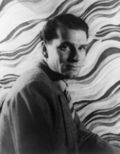 |
Laurence Olivier Laurence Olivier Laurence Kerr Olivier, Baron Olivier, OM was an English actor, director, and producer. He was one of the most famous and revered actors of the 20th century. He married three times, to fellow actors Jill Esmond, Vivien Leigh, and Joan Plowright... |
1907 | 1989 | 82 | ... | Actor |
| Old Tom Parr | 1483 | 1635 | 152 | ... | Supposedly long-lived Englishman | |
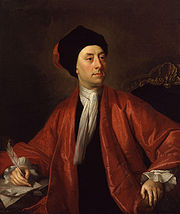 |
Matthew Prior Matthew Prior Matthew Prior was an English poet and diplomat.Prior was the son of a Nonconformist joiner at Wimborne Minster, East Dorset. His father moved to London, and sent him to Westminster School, under Dr. Busby. On his father's death, he left school, and was cared for by his uncle, a vintner in Channel... |
1664 | 1721 | 57 | Grave is unmarked. Name is inscribed on the Cowley gravestone. Memorial was also erected. | Poet and diplomat |
 |
Nicholas Rowe | 1674 | 1718 | 44 | ... | Playwright and poet |
| Charles de Saint-Évremond Charles de Saint-Évremond Charles de Marguetel de Saint-Denis, seigneur de Saint-Évremond was a French soldier, hedonist, essayist and literary critic. After 1661, he lived in exile, mainly in England, as a consequence of his attack on French policy at the time of the peace of the Pyrenees . He is buried in Poets' Corner,... |
1610 | 1703 | 93 | Grave is unmarked. Name is inscribed on the Cowley gravestone. Memorial was also erected. | Essayist and literary critic | |
| Richard Brinsley Sheridan Richard Brinsley Sheridan Richard Brinsley Butler Sheridan was an Irish-born playwright and poet and long-term owner of the London Theatre Royal, Drury Lane. For thirty-two years he was also a Whig Member of the British House of Commons for Stafford , Westminster and Ilchester... |
1751 | 1816 | 64 | ... | Playwright and poet | |
| ... | Robert South Robert South Robert South was an English churchman, known for his combative preaching.-Early life:He was the son of Robert South, a London merchant, and Elizabeth Berry... |
1634 | 1716 | 81 | ... | Theologian and poet |
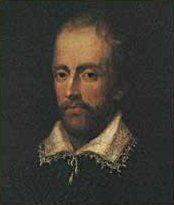 |
Edmund Spenser Edmund Spenser Edmund Spenser was an English poet best known for The Faerie Queene, an epic poem and fantastical allegory celebrating the Tudor dynasty and Elizabeth I. He is recognised as one of the premier craftsmen of Modern English verse in its infancy, and one of the greatest poets in the English... |
c. 1552 | 1599 | 46–47 | ... | Poet |
| ... | Robert Stapylton Robert Stapylton Sir Robert Stapylton or Stapleton was an English courtier, dramatic poet and translator.-Life:He was the third son of Richard Stapleton of Carlton by Snaith, Yorkshire, by Elizabeth, daughter of Sir Henry Pierrepoint of Holme Pierrepoint. He was educated in the Benedictine convent of St. Gregory... |
c.1607 | 1669 | 61–62 | ... | Playwright |
| ... | Mary Steele Mary Steele Mary Steele was the second wife of Sir Richard Steele, whom she married in 1707.She was born in Carmarthen, the daughter of Jonathan Scurlock, Sheriff of Carmarthen... |
1678 | 1718 | 40 | ... | Letter writer |
| Alfred Tennyson Alfred Tennyson, 1st Baron Tennyson Alfred Tennyson, 1st Baron Tennyson, FRS was Poet Laureate of the United Kingdom during much of Queen Victoria's reign and remains one of the most popular poets in the English language.... |
1809 | 1892 | 83 | Large public funeral, 12 October 1892. In 1893 the government formally requested there be a bust of Tennyson in Poets Corner. The businessman-botanist Charles Jenner offered Thomas Woolner Thomas Woolner Thomas Woolner RA was an English sculptor and poet who was one of the founder-members of the Pre-Raphaelite Brotherhood. He was the only sculptor among the original members.... 's 1857 bust of Tennyson to the Abbey, and it was placed near Tennyson's gravestone, by moving a tablet to Christopher Anstey Christopher Anstey Christopher Anstey was an English writer and poet.Anstey was the son of Dr. Anstey, a wealthy clergyman, the rector of Brinkley where he was born. He was educated at Eton College and King's College, Cambridge, where he distinguished himself for his Latin verses. He became a fellow of his college... . There was no formal unveiling ceremony. |
Poet | |
| Connop Thirlwall Connop Thirlwall Connop Thirlwall was an English bishop and historian.-Early life:Thirlwall was born at Stepney, London, of a Northumbrian family. He was a prodigy, learning Latin at three, Greek at four, and writing sermons at seven.He went to Charterhouse School, where George Grote and Julius Hare were among... |
1797 | 1875 | 78 | ... | Bishop and historian | |
| ... | Thomas Triplet Thomas Triplett Thomas Triplett was Canon at Westminster Abbey from 1662, and by his death in 1670 he was Sub-Dean. A schoolmaster in Hayes, Middlesex during the Commonwealth period , there remains a school in Hayes named after him.-Early life:Thomas Triplett was christened on 6 April 1602, at St Nicholas Cole... |
1602 | 1670 | 68 | ... | Prebendary |
| ... | Owen Tudor | 1429 | 1501 | 71–72 | ... | Monk of Westminster |
Memorials
| Image | Name | Born | Died | Age at death | Year commemorated |
Details of memorial |
Occupation |
|---|---|---|---|---|---|---|---|
| Joseph Addison Joseph Addison Joseph Addison was an English essayist, poet, playwright and politician. He was a man of letters, eldest son of Lancelot Addison... |
1672 | 1719 | 47 | 1809 | Statue | Poet | |
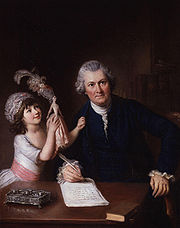 |
Christopher Anstey Christopher Anstey Christopher Anstey was an English writer and poet.Anstey was the son of Dr. Anstey, a wealthy clergyman, the rector of Brinkley where he was born. He was educated at Eton College and King's College, Cambridge, where he distinguished himself for his Latin verses. He became a fellow of his college... |
1724 | 1805 | 80 | 1807 | Stone tablet | Poet and author |
 |
Matthew Arnold Matthew Arnold Matthew Arnold was a British poet and cultural critic who worked as an inspector of schools. He was the son of Thomas Arnold, the famed headmaster of Rugby School, and brother to both Tom Arnold, literary professor, and William Delafield Arnold, novelist and colonial administrator... |
1822 | 1888 | 65 | 1891 | Bust | Poet |
 |
Matthew Arnold Matthew Arnold Matthew Arnold was a British poet and cultural critic who worked as an inspector of schools. He was the son of Thomas Arnold, the famed headmaster of Rugby School, and brother to both Tom Arnold, literary professor, and William Delafield Arnold, novelist and colonial administrator... |
1822 | 1888 | 65 | 1989 | Mural tablet | Poet |
 |
Peggy Ashcroft Peggy Ashcroft Dame Peggy Ashcroft, DBE was an English actress.-Early years:Born as Edith Margaret Emily Ashcroft in Croydon, Ashcroft attended the Woodford School, Croydon and the Central School of Speech and Drama... |
1907 | 1991 | 83 | 2005 | Floor stone | Actress |
 |
W. H. Auden W. H. Auden Wystan Hugh Auden , who published as W. H. Auden, was an Anglo-American poet,The first definition of "Anglo-American" in the OED is: "Of, belonging to, or involving both England and America." See also the definition "English in origin or birth, American by settlement or citizenship" in See also... |
1907 | 1973 | 66 | 1974 | Floor stone | Poet |
| Jane Austen Jane Austen Jane Austen was an English novelist whose works of romantic fiction, set among the landed gentry, earned her a place as one of the most widely read writers in English literature, her realism and biting social commentary cementing her historical importance among scholars and critics.Austen lived... |
1775 | 1817 | 41 | 1967 | Wall tablet | Author | |
 |
John Betjeman John Betjeman Sir John Betjeman, CBE was an English poet, writer and broadcaster who described himself in Who's Who as a "poet and hack".He was a founding member of the Victorian Society and a passionate defender of Victorian architecture... |
1906 | 1984 | 77 | 1996 | Floor stone | Poet and author |
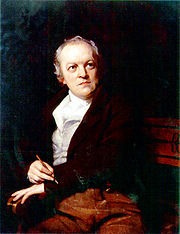 |
William Blake William Blake William Blake was an English poet, painter, and printmaker. Largely unrecognised during his lifetime, Blake is now considered a seminal figure in the history of both the poetry and visual arts of the Romantic Age... |
1757 | 1827 | 69 | 1957 | Memorial bust | Poet and artist |
| ... | Barton Booth Barton Booth Barton Booth was one of the most famous dramatic actors of the first part of the 18th century.Booth was from Lancashire and was educated at Westminster School, where his success in the Latin play Andria gave him an inclination for the stage... |
1681 | 1733 | 51–52 | 1772 | Monument | Actor |
| Charlotte Brontë Charlotte Brontë Charlotte Brontë was an English novelist and poet, the eldest of the three Brontë sisters who survived into adulthood, whose novels are English literature standards... |
1816 | 1855 | 38 | 1947 | Memorial tablet | Author | |
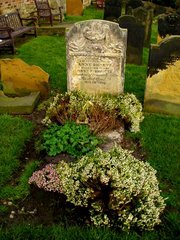 |
Anne Brontë Anne Brontë Anne Brontë was a British novelist and poet, the youngest member of the Brontë literary family.The daughter of a poor Irish clergyman in the Church of England, Anne Brontë lived most of her life with her family at the parish of Haworth on the Yorkshire moors. For a couple of years she went to a... |
1820 | 1849 | 29 | 1947 | Memorial tablet | Author |
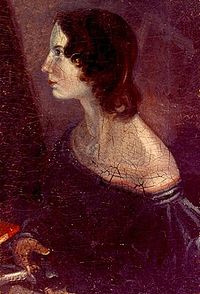 |
Emily Brontë Emily Brontë Emily Jane Brontë 30 July 1818 – 19 December 1848) was an English novelist and poet, best remembered for her only novel, Wuthering Heights, now considered a classic of English literature. Emily was the third eldest of the four surviving Brontë siblings, between the youngest Anne and her brother... |
1818 | 1848 | 30 | 1947 | Memorial tablet | Author |
| Elizabeth Browning | 1806 | 1861 | 55 | 1906 | Floor stone | Poet | |
_by_edward_francisco_burney.jpg) |
Fanny Burney | 1752 | 1840 | 87 | 2002 | Panel on Hubbard memorial window | Author and playwright |
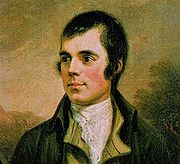 |
Robert Burns Robert Burns Robert Burns was a Scottish poet and a lyricist. He is widely regarded as the national poet of Scotland, and is celebrated worldwide... |
1759 | 1796 | 37 | 1885 | Memorial bust by John Steell John Steell Sir John Robert Steell RSA was a Scottish sculptor. He was born in Aberdeen on 18 September 1804, but his family moved to Edinburgh around one year after his birth. He is best known for a number of sculptures displayed in Edinburgh, including the statue of Sir Walter Scott at the Scott Monument... . Unveiled 7 March 1885 by the Earl of Rosebery Archibald Primrose, 5th Earl of Rosebery Archibald Philip Primrose, 5th Earl of Rosebery, KG, PC was a British Liberal statesman and Prime Minister. Between the death of his father, in 1851, and the death of his grandfather, the 4th Earl, in 1868, he was known by the courtesy title of Lord Dalmeny.Rosebery was a Liberal Imperialist who... . |
Poet |
 |
Samuel Butler Samuel Butler (poet) Samuel Butler was a poet and satirist. Born in Strensham, Worcestershire and baptised 14 February 1613, he is remembered now chiefly for a long satirical burlesque poem on Puritanism entitled Hudibras.-Biography:... |
1612 | 1680 | 68 | 1721 | Memorial bust | Poet |
 |
George Gordon Byron George Gordon Byron, 6th Baron Byron George Gordon Byron, 6th Baron Byron, later George Gordon Noel, 6th Baron Byron, FRS , commonly known simply as Lord Byron, was a British poet and a leading figure in the Romantic movement... |
1788 | 1824 | 36 | 1969 | Floor stone | Poet |
| Caedmon | fl.657 | fl.680 | unknown | 1966 | Floor stone | Poet | |
| John Campbell John Campbell, 2nd Duke of Argyll Field Marshal John Campbell, 2nd Duke of Argyll, 1st Duke of Greenwich KG , known as Iain Ruaidh nan Cath or Red John of the Battles, was a Scottish soldier and nobleman.-Early Life:... |
1678 | 1743 | 64 | 1749 | Monument | Soldier and nobleman | |
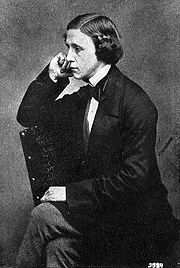 |
Lewis Carroll Lewis Carroll Charles Lutwidge Dodgson , better known by the pseudonym Lewis Carroll , was an English author, mathematician, logician, Anglican deacon and photographer. His most famous writings are Alice's Adventures in Wonderland and its sequel Through the Looking-Glass, as well as the poems "The Hunting of the... |
1832 | 1898 | 65 | 1982 | Floor stone | Author |
| John Clare John Clare John Clare was an English poet, born the son of a farm labourer who came to be known for his celebratory representations of the English countryside and his lamentation of its disruption. His poetry underwent a major re-evaluation in the late 20th century and he is often now considered to be among... |
1793 | 1864 | 70 | 1989 | Floor stone | Poet | |
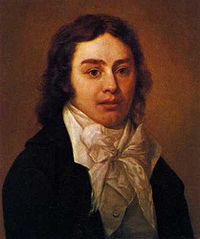 |
Samuel Taylor Coleridge Samuel Taylor Coleridge Samuel Taylor Coleridge was an English poet, Romantic, literary critic and philosopher who, with his friend William Wordsworth, was a founder of the Romantic Movement in England and a member of the Lake Poets. He is probably best known for his poems The Rime of the Ancient Mariner and Kubla... |
1772 | 1834 | 61 | 1885 | Memorial bust | Poet |
| George Eliot George Eliot Mary Anne Evans , better known by her pen name George Eliot, was an English novelist, journalist and translator, and one of the leading writers of the Victorian era... |
1819 | 1880 | 61 | 1980 | Floor stone | Author | |
| T. S. Eliot T. S. Eliot Thomas Stearns "T. S." Eliot OM was a playwright, literary critic, and arguably the most important English-language poet of the 20th century. Although he was born an American he moved to the United Kingdom in 1914 and was naturalised as a British subject in 1927 at age 39.The poem that made his... |
1888 | 1965 | 76 | 1967 | Floor stone | Poet and playwright | |
 |
Oliver Goldsmith Oliver Goldsmith Oliver Goldsmith was an Irish writer, poet and physician known for his novel The Vicar of Wakefield , his pastoral poem The Deserted Village , and his plays The Good-Natur'd Man and She Stoops to Conquer... |
1728 | 1774 | 45 | 1776 | Memorial tablet and bust | Poet and playwright |
 |
Adam Lindsay Gordon Adam Lindsay Gordon Adam Lindsay Gordon was an Australian poet, jockey and politician.- Early life :Gordon was born at Fayal in the Azores, son of Captain Adam Durnford Gordon who had married his first cousin, Harriet Gordon, both of whom were descended from Adam of Gordon of the ballad... |
1833 | 1870 | 36 | 1934 | Memorial bust | Poet |
| ... | John Ernest Grabe John Ernest Grabe John Ernest Grabe , Anglican divine, was born at Königsberg, where his father, Martin Sylvester Grabe, was professor of theology and history.... |
1666 | 1711 | 44–45 | 1727 | Monument | Priest and theologian |
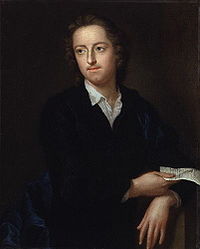 |
Thomas Gray Thomas Gray Thomas Gray was a poet, letter-writer, classical scholar and professor at Cambridge University.-Early life and education:... |
1716 | 1771 | 54 | 1778 | Monument | Poet and historian |
 |
Stephen Hales Stephen Hales Stephen Hales, FRS was an English physiologist, chemist and inventor.Hales studied the role of air and water in the maintenance of both plant and animal life. He gave accurate accounts of the movements of water in plants, and demonstrated that plants absorb air... |
1677 | 1761 | 83 | 1761 | Monument | Priest and scientist |
 |
Robert Herrick Robert Herrick (poet) Robert Herrick was a 17th-century English poet.-Early life:Born in Cheapside, London, he was the seventh child and fourth son of Julia Stone and Nicholas Herrick, a prosperous goldsmith.... |
1591 | 1674 | 83 | 1994 | Panel on Hubbard memorial window | Poet |
 |
Gerard Manley Hopkins Gerard Manley Hopkins Gerard Manley Hopkins, S.J. was an English poet, Roman Catholic convert, and Jesuit priest, whose posthumous 20th-century fame established him among the leading Victorian poets... |
1844 | 1889 | 44 | 1975 | Floor stone | Poet |
| A. E. Housman | 1859 | 1936 | 77 | 1996 | Panel on Hubbard memorial window | Poet | |
 |
Henry James Henry James Henry James, OM was an American-born writer, regarded as one of the key figures of 19th-century literary realism. He was the son of Henry James, Sr., a clergyman, and the brother of philosopher and psychologist William James and diarist Alice James.... |
1843 | 1916 | 72 | 1976 | Floor stone | Author |
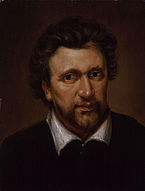 |
Ben Jonson Ben Jonson Benjamin Jonson was an English Renaissance dramatist, poet and actor. A contemporary of William Shakespeare, he is best known for his satirical plays, particularly Volpone, The Alchemist, and Bartholomew Fair, which are considered his best, and his lyric poems... |
1572 | 1637 | 65 | 1723 | Floor stone | Playwright and poet |
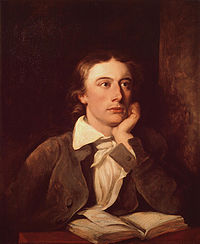 |
John Keats John Keats John Keats was an English Romantic poet. Along with Lord Byron and Percy Bysshe Shelley, he was one of the key figures in the second generation of the Romantic movement, despite the fact that his work had been in publication for only four years before his death.Although his poems were not... |
1795 | 1821 | 25 | 1954 | Mural tablet | Poet |
| John Keble John Keble John Keble was an English churchman and poet, one of the leaders of the Oxford Movement, and gave his name to Keble College, Oxford.-Early life:... |
1792 | 1866 | 73 | 1873 | Bust | Poet | |
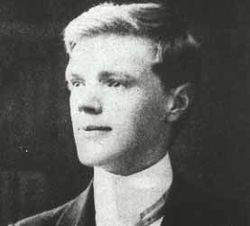 |
D. H. Lawrence D. H. Lawrence David Herbert Richards Lawrence was an English novelist, poet, playwright, essayist, literary critic and painter who published as D. H. Lawrence. His collected works represent an extended reflection upon the dehumanising effects of modernity and industrialisation... |
1885 | 1930 | 44 | 1985 | Floor stone | Author and poet |
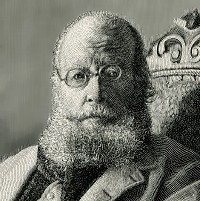 |
Edward Lear Edward Lear Edward Lear was an English artist, illustrator, author, and poet, renowned today primarily for his literary nonsense, in poetry and prose, and especially his limericks, a form that he popularised.-Biography:... |
1812 | 1888 | 75 | 1988 | Floor stone | Author and poet |
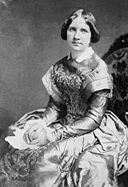 |
Jenny Lind Jenny Lind Johanna Maria Lind , better known as Jenny Lind, was a Swedish opera singer, often known as the "Swedish Nightingale". One of the most highly regarded singers of the 19th century, she is known for her performances in soprano roles in opera in Sweden and across Europe, and for an extraordinarily... |
1820 | 1887 | 67 | 1894 | Wall tablet. "A medallion portrait of the famous singer – the last work of the late Mr Birch – has been placed in Poets' Corner, Westminster Abbey, and was yesterday unveiled by the Princess Christian Princess Helena of the United Kingdom Princess Helena was a member of the British Royal Family, the third daughter and fifth child of Queen Victoria and Prince Albert.... ." |
Opera singer |
 |
Henry Wadsworth Longfellow Henry Wadsworth Longfellow Henry Wadsworth Longfellow was an American poet and educator whose works include "Paul Revere's Ride", The Song of Hiawatha, and Evangeline... |
1807 | 1882 | 75 | 1884 | Memorial bust by Thomas Brock Thomas Brock Sir Thomas Brock KCB RA was an English sculptor.- Life :Brock was born in Worcester, attended the School of Design in Worcester and then undertook an apprenticeship in modelling at the Worcester Royal Porcelain Works. In 1866 he became a pupil of the sculptor John Henry Foley. He married in 1869,... , unveiled 1 March 1884. |
Poet |
| F. W. Maitland | 1850 | 1906 | 56 | 2001 | Floor stone | Historian | |
 |
Christopher Marlowe Christopher Marlowe Christopher Marlowe was an English dramatist, poet and translator of the Elizabethan era. As the foremost Elizabethan tragedian, next to William Shakespeare, he is known for his blank verse, his overreaching protagonists, and his mysterious death.A warrant was issued for Marlowe's arrest on 18 May... |
1564 | 1593 | 29 | 2002 | Panel on Hubbard memorial window | Playwright and poet |
| William Mason William Mason (poet) William Mason was an English poet, editor and gardener.He was born in Hull and educated at Hull Grammar School and St John's College, Cambridge. He was ordained in 1754 and held a number of posts in the church.... |
1724 | 1797 | 72–73 | 1799 | Monument | Poet | |
| ... | Thomas May Thomas May Thomas May was an English poet, dramatist and historian of the Renaissance era.- Early life and career until 1630 :... |
1595 | 1650 | 54–56 | 1880 | Wall stone | Poet and playwright |
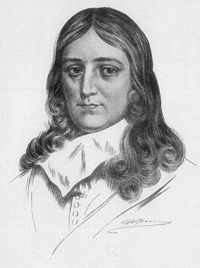 |
John Milton John Milton John Milton was an English poet, polemicist, a scholarly man of letters, and a civil servant for the Commonwealth of England under Oliver Cromwell... |
1608 | 1674 | 65 | 1737 | Monument | Poet and author |
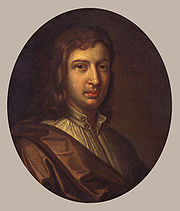 |
John Phillips | 1676 | 1709 | 32 | 1710 | Monument | Poet |
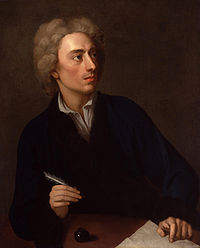 |
Alexander Pope Alexander Pope Alexander Pope was an 18th-century English poet, best known for his satirical verse and for his translation of Homer. He is the third-most frequently quoted writer in The Oxford Dictionary of Quotations, after Shakespeare and Tennyson... |
1688 | 1744 | 56 | 1994 | Panel on Hubbard memorial window | Poet |
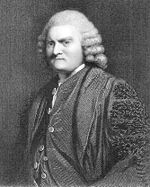 |
John Pringle John Pringle Sir John Pringle, 1st Baronet, FRS was a Scottish physician who has been called the "father of military medicine" .... |
1707 | 1782 | 74 | ... | Monument | Military physician |
| Hannah Pritchard Hannah Pritchard Hannah Pritchard was an English actress.Born Hannah Vaughan and married to an actor William Pritchard at a young age, she first attracted attention as a singer at Bartholomew Fair in 1733 She was born on 11th July 1711 to her father Oliver Pritchard. Her mothers name is not known... |
1711 | 1768 | 56–57 | ... | Monument. Later moved to the triforium. | Actress | |
| John Ruskin John Ruskin John Ruskin was the leading English art critic of the Victorian era, also an art patron, draughtsman, watercolourist, a prominent social thinker and philanthropist. He wrote on subjects ranging from geology to architecture, myth to ornithology, literature to education, and botany to political... |
1819 | 1900 | 80 | 1902 | Portrait roundel in bronze by Onslow Ford. Unveiled 8 February 1902, after a controversy over whether Ruskin felt monuments like this wasted money and disfigured a building's architectural unity. | Poet and art critic | |
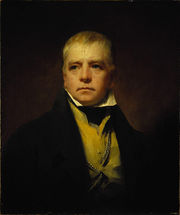 |
Walter Scott Walter Scott Sir Walter Scott, 1st Baronet was a Scottish historical novelist, playwright, and poet, popular throughout much of the world during his time.... |
1771 | 1832 | 61 | 1897 | Bust by the Scottish sculptor Hutchinson, "a beautifully executed copy of the famous Chantrey bust at Abbotsford Abbotsford House Abbotsford is a historic house in the region of the Scottish Borders in the south of Scotland, near Melrose, on the south bank of the River Tweed. It was formerly the residence of historical novelist and poet, Walter Scott... ". |
Author and poet |
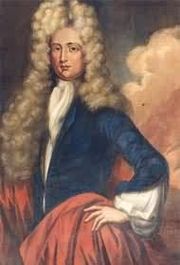 |
Thomas Shadwell Thomas Shadwell Thomas Shadwell was an English poet and playwright who was appointed poet laureate in 1689.-Life:Shadwell was born at Stanton Hall, Norfolk, and educated at Bury St Edmunds School, and at Gonville and Caius College, Cambridge, which he entered in 1656. He left the university without a degree, and... |
c.1642 | 1692 | ~50 | c.1700 | Monument | Poet and playwright |
 |
William Shakespeare William Shakespeare William Shakespeare was an English poet and playwright, widely regarded as the greatest writer in the English language and the world's pre-eminent dramatist. He is often called England's national poet and the "Bard of Avon"... |
1564 | 1616 | 52 | 1740 | Monument | Playwright and poet |
| Granville Sharp Granville Sharp Granville Sharp was one of the first English campaigners for the abolition of the slave trade. He also involved himself in trying to correct other social injustices. Sharp formulated the plan to settle blacks in Sierra Leone, and founded the St. George's Bay Company, a forerunner of the Sierra... |
1735 | 1813 | 77 | 1816 | Monument | Slavery abolitionist | |
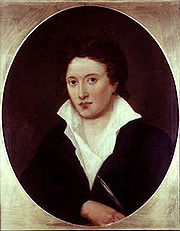 |
Percy Bysshe Shelley Percy Bysshe Shelley Percy Bysshe Shelley was one of the major English Romantic poets and is critically regarded as among the finest lyric poets in the English language. Shelley was famous for his association with John Keats and Lord Byron... |
1792 | 1822 | 29 | 1954 | Mural tablet | Poet |
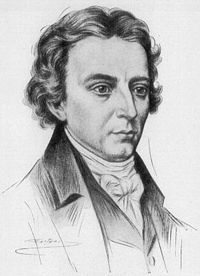 |
Robert Southey Robert Southey Robert Southey was an English poet of the Romantic school, one of the so-called "Lake Poets", and Poet Laureate for 30 years from 1813 to his death in 1843... |
1774 | 1843 | 68 | 1845 | Monument | Poet |
| William Makepeace Thackeray William Makepeace Thackeray William Makepeace Thackeray was an English novelist of the 19th century. He was famous for his satirical works, particularly Vanity Fair, a panoramic portrait of English society.-Biography:... |
1811 | 1863 | 52 | 1865 | Bust | Author | |
.jpg) |
James Thomson | 1700 | 1748 | 47 | 1762 | Monument | Poet and playwright |
 |
Dylan Thomas Dylan Thomas Dylan Marlais Thomas was a Welsh poet and writer, Encyclopædia Britannica. Retrieved 11 January 2008. who wrote exclusively in English. In addition to poetry, he wrote short stories and scripts for film and radio, which he often performed himself... |
1914 | 1953 | 39 | 1982 | Floor stone | Poet and author |
_-_trollope,_anthony_(1815-1882).jpg) |
Anthony Trollope Anthony Trollope Anthony Trollope was one of the most successful, prolific and respected English novelists of the Victorian era. Some of his best-loved works, collectively known as the Chronicles of Barsetshire, revolve around the imaginary county of Barsetshire... |
1815 | 1882 | 67 | 1993 | Floor stone | Author |
| ... | William Vincent William Vincent William Vincent was Dean of Westminster from 1803 to 1815.-Biography:Vincent born on 2 November 1739 in Limehouse Street Ward, London, was the fifth surviving son of Giles Vincent, packer and Portugal merchant, by Sarah .-Theological career:William was admitted at Westminster School as a ‘town... |
1739 | 1815 | 76 | c.1815 1 | Monument | Dean of Westminster |
| Oscar Wilde Oscar Wilde Oscar Fingal O'Flahertie Wills Wilde was an Irish writer and poet. After writing in different forms throughout the 1880s, he became one of London's most popular playwrights in the early 1890s... |
1854 | 1900 | 46 | 1995 | Panel on Hubbard memorial window | Playwright and author | |
 |
William Wordsworth William Wordsworth William Wordsworth was a major English Romantic poet who, with Samuel Taylor Coleridge, helped to launch the Romantic Age in English literature with the 1798 joint publication Lyrical Ballads.... |
1770 | 1850 | 80 | 1854 | Monument | Poet |
 |
James Wyatt James Wyatt James Wyatt RA , was an English architect, a rival of Robert Adam in the neoclassical style, who far outdid Adam in his work in the neo-Gothic style.-Early classical career:... |
1746 | 1813 | 67 | ... | Monument | Architect |
World War I poets
The memorial in Poets' Corner, Westminster Abbey, to 16 Great War poets is a slate stone slab with the names of the poets inscribed on it. It was unveiled on 11 November 1985, the 67th anniversary of the ArmisticeArmistice with Germany (Compiègne)
The armistice between the Allies and Germany was an agreement that ended the fighting in the First World War. It was signed in a railway carriage in Compiègne Forest on 11 November 1918 and marked a victory for the Allies and a complete defeat for Germany, although not technically a surrender...
. An additional inscription quotes Owen
Wilfred Owen
Wilfred Edward Salter Owen MC was an English poet and soldier, one of the leading poets of the First World War...
's "Preface":
| Image | Poet | Born | Died | Age when war started |
Notes on war service |
Notes on poetry |
|---|---|---|---|---|---|---|
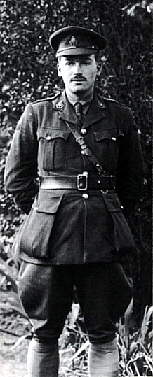 |
Richard Aldington Richard Aldington Richard Aldington , born Edward Godfree Aldington, was an English writer and poet.Aldington was best known for his World War I poetry, the 1929 novel, Death of a Hero, and the controversy arising from his 1955 Lawrence of Arabia: A Biographical Inquiry... |
1892 | 1962 | 22 | Enlisted 1916 Commissioned 1917 Second Lieutenant Royal Sussex Regiment Royal Sussex Regiment The Royal Sussex Regiment was an infantry regiment of the British Army from 1881 to 1966. The regiment was formed as part of the Childers reforms by the amalgamation of the 35th Regiment of Foot and the 107th Regiment of Foot... |
... |
| ... | Laurence Binyon Laurence Binyon Robert Laurence Binyon was an English poet, dramatist and art scholar. His most famous work, For the Fallen, is well known for being used in Remembrance Sunday services.... |
1869 | 1943 | 44 | Volunteered in 1915 and 1916 Hôpital Temporaire d'Arc-en-Barrois British hospital for French soldiers |
... |
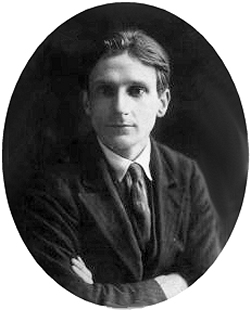 |
Edmund Blunden Edmund Blunden Edmund Charles Blunden, MC was an English poet, author and critic. Like his friend Siegfried Sassoon, he wrote of his experiences in World War I in both verse and prose. For most of his career, Blunden was also a reviewer for English publications and an academic in Tokyo and later Hong Kong... |
1896 | 1974 | 17 | Commissioned August 1915 Second Lieutenant Royal Sussex Regiment Royal Sussex Regiment The Royal Sussex Regiment was an infantry regiment of the British Army from 1881 to 1966. The regiment was formed as part of the Childers reforms by the amalgamation of the 35th Regiment of Foot and the 107th Regiment of Foot... |
... |
 |
Rupert Brooke Rupert Brooke Rupert Chawner Brooke was an English poet known for his idealistic war sonnets written during the First World War, especially The Soldier... † |
1887 | 1915 | 27 | Commissioned August 1914 Temporary Sub-Lieutenant Royal Naval Volunteer Reserve |
... |
| ... | Wilfrid Gibson Wilfrid Wilson Gibson Wilfrid Wilson Gibson was a British Georgian poet, associated with World War I but also the author of much later work.-Early work:... |
1878 | 1962 | 35 | Rejected several times Enlisted October 1917 Army Service Corps (Motor Transport) Never saw active service |
... |
| ... | Robert Graves Robert Graves Robert von Ranke Graves 24 July 1895 – 7 December 1985 was an English poet, translator and novelist. During his long life he produced more than 140 works... |
1895 | 1985 | 19 | Commissioned 1914 Royal Welch Fusiliers Royal Welch Fusiliers The Royal Welch Fusiliers was an infantry regiment of the British Army, part of the Prince of Wales' Division. It was founded in 1689 to oppose James II and the imminent war with France... |
... |
| Julian Grenfell Julian Grenfell The Honourable Julian Henry Francis Grenfell DSO , was a British soldier and poet of World War I.-Early life:Julian Grenfell was born at 4 St James's Square, London, the eldest son of William Grenfell, later Baron Desborough, and Ethel Priscilla Fane, daughter of Julian Fane... † |
1888 | 1915 | 26 | Commissioned 1910 Captain (at time of death) Royal Dragoons Royal Dragoons The Royal Dragoons was a cavalry regiment of the British Army. The regiment was formed in 1661, and served until 1969, when it was amalgamated with the Royal Horse Guards to form The Blues and Royals.... |
... | |
| ... | Ivor Gurney Ivor Gurney Ivor Bertie Gurney was an English composer and poet.-Life:Born at 3 Queen Street, Gloucester in 1890, the second of four children of David Gurney, a tailor, and his wife Florence, a seamstress, Gurney showed musical ability early... |
1890 | 1937 | 23 | Private Gloucestershire Regiment |
... |
| ... | David Jones David Jones (poet) David Jones CH was both a painter and one of the first generation British modernist poets. As a painter he worked chiefly in watercolor, painting portraits and animal, landscape, legendary and religious subjects. He was also a wood-engraver and designer of inscriptions. As a writer he was... |
1895 | 1974 | 18 | Royal Welch Fusiliers Royal Welch Fusiliers The Royal Welch Fusiliers was an infantry regiment of the British Army, part of the Prince of Wales' Division. It was founded in 1689 to oppose James II and the imminent war with France... |
... |
| ... | Robert Nichols | 1893 | 1944 | 20 | Commissioned 1914 Royal Artillery Royal Artillery The Royal Regiment of Artillery, commonly referred to as the Royal Artillery , is the artillery arm of the British Army. Despite its name, it comprises a number of regiments.-History:... |
... |
| Wilfred Owen Wilfred Owen Wilfred Edward Salter Owen MC was an English poet and soldier, one of the leading poets of the First World War... † |
1893 | 1918 | 21 | Enlisted 1915 Commissioned June 1916 Second Lieutenant Manchester Regiment |
... | |
| Herbert Read Herbert Read Sir Herbert Edward Read, DSO, MC was an English anarchist, poet, and critic of literature and art. He was one of the earliest English writers to take notice of existentialism, and was strongly influenced by proto-existentialist thinker Max Stirner.... |
1893 | 1968 | 20 | Captain Green Howards |
... | |
| Isaac Rosenberg Isaac Rosenberg Isaac Rosenberg was an English poet of the First World War who was considered to be one of the greatest of all English war poets... † |
1890 | 1918 | 23 | Enlisted October 1915 12th Suffolk Folk Regiment King's Own Royal Lancaster |
... | |
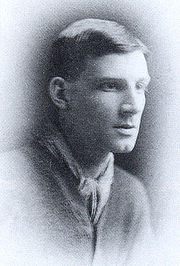 |
Siegfried Sassoon Siegfried Sassoon Siegfried Loraine Sassoon CBE MC was an English poet, author and soldier. Decorated for bravery on the Western Front, he became one of the leading poets of the First World War. His poetry both described the horrors of the trenches, and satirised the patriotic pretensions of those who, in Sassoon's... |
1886 | 1967 | 27 | Enlisted 1914 Commissioned May 1915 Captain (at end of war) Royal Welch Fusiliers Royal Welch Fusiliers The Royal Welch Fusiliers was an infantry regiment of the British Army, part of the Prince of Wales' Division. It was founded in 1689 to oppose James II and the imminent war with France... |
... |
| Charles Sorley Charles Sorley Charles Hamilton Sorley was a British poet of World War I.Born in Aberdeen, Scotland, he was the son of William Ritchie Sorley. He was educated, like Siegfried Sassoon, at Marlborough College... † |
1895 | 1915 | 19 | Enlisted 1914 Captain (at time of death) Suffolk Regiment Suffolk Regiment The Suffolk Regiment was an infantry regiment of the line in the British Army with a history dating back to 1685. It saw service for three centuries, before being amalgamated with the Royal Norfolk Regiment as the 1st East Anglian Regiment in 1959... |
... | |
| Edward Thomas Edward Thomas (poet) Philip Edward Thomas was an Anglo-Welsh writer of prose and poetry. He is commonly considered a war poet, although few of his poems deal directly with his war experiences. Already an accomplished writer, Thomas turned to poetry only in 1914... † |
1878 | 1917 | 36 | Enlisted July 1915 Artists Rifles Commissioned November 1916 Royal Garrison Artillery Royal Garrison Artillery The Royal Garrison Artillery was an arm of the Royal Artillery that was originally tasked with manning the guns of the British Empire's forts and fortresses, including coastal artillery batteries, the heavy gun batteries attached to each infantry division, and the guns of the siege... |
... |
Royal Ballet
The stone slab floor memorial to the four founders of the Royal Ballet was dedicated on 17 November 2009.| Image | Name | Born | Died | Age at death | Notes on Royal Ballet role |
|---|---|---|---|---|---|
| Ninette de Valois Ninette de Valois Dame Ninette de Valois, OM, CH, DBE, FRAD, FISTD was an Irish-born British dancer, teacher, choreographer and director of classical ballet... |
1898 | 2001 | 102 | ... | |
| ... | Frederick Ashton Frederick Ashton Sir Frederick William Mallandaine Ashton OM, CH, CBE was a leading international dancer and choreographer. He is most noted as the founder choreographer of The Royal Ballet in London, but also worked as a director and choreographer of opera, film and theatre revues.-Early life:Ashton was born at... |
1904 | 1988 | 84 | ... |
| Constant Lambert Constant Lambert Leonard Constant Lambert was a British composer and conductor.-Early life:Lambert, the son of Russian-born Australian painter George Lambert, was educated at Christ's Hospital and the Royal College of Music... |
1905 | 1951 | 45 | ... | |
| Margot Fonteyn Margot Fonteyn Dame Margot Fonteyn de Arias, DBE , was an English ballerina of the 20th century. She is widely regarded as one of the greatest classical ballet dancers of all time... |
1919 | 1991 | 71 | ... |
Elsewhere in the Abbey
Poets and writers commemorated elsewhere in Westminster Abbey, but not in Poets' Corner proper.| Image | Name | Born | Died | Age at death | Year commemorated |
Details of memorial |
Notes on artistic career |
|---|---|---|---|---|---|---|---|
| ... | Robert Ayton Robert Ayton Sir Robert Aytoun was a Scottish poet.Ayton was the son of Ayton of Kinaldie House in Fife.He and his elder brother entered St Leonard's College in St Andrews in 1584. After graduating MA from St... |
1570 | 1638 | 67–68 | Bust | Poet | |
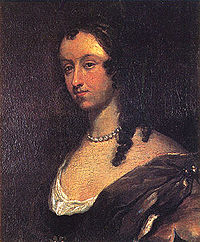 |
Aphra Behn Aphra Behn Aphra Behn was a prolific dramatist of the English Restoration and was one of the first English professional female writers. Her writing contributed to the amatory fiction genre of British literature.-Early life:... |
1640 | 1689 | 48 | Gravestone | Author and playwright | |
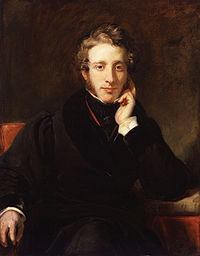 |
Edward Bulwer Lytton | 1803 | 1873 | 69 | Gravestone | Author and poet | |
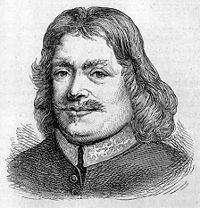 |
John Bunyan John Bunyan John Bunyan was an English Christian writer and preacher, famous for writing The Pilgrim's Progress. Though he was a Reformed Baptist, in the Church of England he is remembered with a Lesser Festival on 30 August, and on the liturgical calendar of the Episcopal Church on 29 August.-Life:In 1628,... |
1628 | 1688 | 59 | 1912 | Memorial window | Author |
| Margaret Cavendish Margaret Cavendish Margaret Cavendish, Duchess of Newcastle-upon-Tyne was an English aristocrat, a prolific writer, and a scientist. Born Margaret Lucas, she was the youngest sister of prominent royalists Sir John Lucas and Sir Charles Lucas... |
1623 | 1673 | 69–70 | Monument | Author and poet | ||
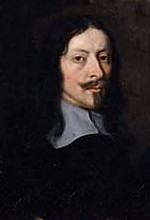 |
William Cavendish | 1592 | 1676 | 84 | Monument | Playwright and poet | |
| William Congreve William Congreve William Congreve was an English playwright and poet.-Early life:Congreve was born in Bardsey, West Yorkshire, England . His parents were William Congreve and his wife, Mary ; a sister was buried in London in 1672... |
1670 | 1729 | 58 | c.1730 | Monument | Playwright and poet | |
| Noël Coward Noël Coward Sir Noël Peirce Coward was an English playwright, composer, director, actor and singer, known for his wit, flamboyance, and what Time magazine called "a sense of personal style, a combination of cheek and chic, pose and poise".Born in Teddington, a suburb of London, Coward attended a dance academy... |
1899 | 1973 | 73 | 1984 | Floor stone | Playwright and composer | |
 |
William Cowper William Cowper William Cowper was an English poet and hymnodist. One of the most popular poets of his time, Cowper changed the direction of 18th century nature poetry by writing of everyday life and scenes of the English countryside. In many ways, he was one of the forerunners of Romantic poetry... |
1731 | 1800 | 68 | 1876 | Memorial window | Poet and hymnodist |
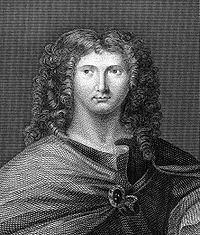 |
Wentworth Dillon | 1637 | 1685 | 47–48 | Grave not marked | Poet | |
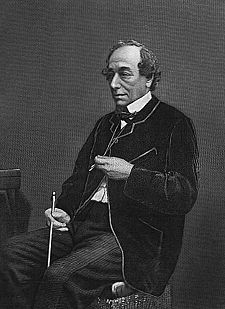 |
Benjamin Disraeli | 1804 | 1881 | 76 | 1884 | Statue | Author |
| George Herbert George Herbert George Herbert was a Welsh born English poet, orator and Anglican priest.Being born into an artistic and wealthy family, he received a good education that led to his holding prominent positions at Cambridge University and Parliament. As a student at Trinity College, Cambridge, Herbert excelled in... |
1593 | 1633 | 39 | 1876 | Memorial window | Poet and orator | |
| Robert Howard Robert Howard (playwright) Sir Robert Howard was an English playwright and politician, born to Thomas Howard, 1st Earl of Berkshire and his wife Elizabeth.-Life:... |
1626 | 1698 | 72 | Playwright | |||
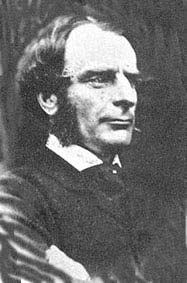 |
Charles Kingsley Charles Kingsley Charles Kingsley was an English priest of the Church of England, university professor, historian and novelist, particularly associated with the West Country and northeast Hampshire.-Life and character:... |
1819 | 1875 | 55 | 1875 | Bust | Author |
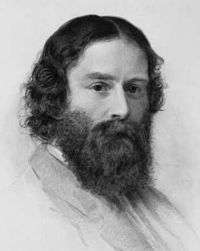 |
James R. Lowell | 1819 | 1891 | 72 | Tablet and window | Poet | |
| F. D. Maurice | 1805 | 1872 | 66 | 1932 | Bust | Author | |
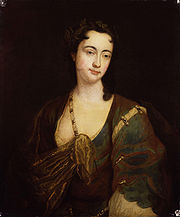 |
Anne Oldfield Anne Oldfield Anne Oldfield , English actress, was born in London, the daughter of a soldier.She worked for a time as apprentice to a seamstress, until she attracted George Farquhar's attention by reciting some lines from a play in his hearing... |
1683 | 1730 | 47 | Gravestone | Actress | |
| Henry Spelman Henry Spelman Sir Henry Spelman was an English antiquary, noted for his detailed collections of medieval records, in particular of church councils.-Life:... |
c.1564 | 1641 | 76–77 | Gravestone | Antiquarian | ||
 |
Arthur P. Stanley | 1815 | 1881 | 65 | 1884 | Tomb and effigy | Author |
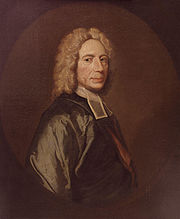 |
Isaac Watts Isaac Watts Isaac Watts was an English hymnwriter, theologian and logician. A prolific and popular hymnwriter, he was recognised as the "Father of English Hymnody", credited with some 750 hymns... |
1674 | 1748 | 74 | 1779 | Monument | Hymnodist |
See also
Information about the last resting places of other famous poets can be found at:- Find a GraveFind A GraveFind a Grave is a commercial website providing free access and input to an online database of cemetery records. It was founded in 1998 as a DBA and incorporated in 2000.-History:...
- Poets' GravesPoets' GravesPoets' Graves is an on-line database of the last resting places of poets. The site is regularly archived by the British Library so that it remains available to future researchers.-History:...
Poets' Corner is also the title of a play by James Huntrods, and The Poets' Corner
The Poets' Corner
The Poets' Corner is a book of twenty caricatures by English caricaturist, essayist and parodist Max Beerbohm. It was published in 1904 by William Heinemann, and was Beerbohm's second book of caricatures, the first being Caricatures of Twenty-five Gentlemen .Named after Poets’ Corner, the name...
was a book of caricatures of famous poets by Max Beerbohm
Max Beerbohm
Sir Henry Maximilian "Max" Beerbohm was an English essayist, parodist and caricaturist best known today for his 1911 novel Zuleika Dobson.-Early life:...
published in 1904.

